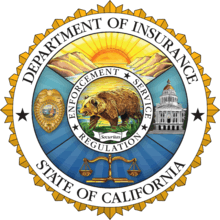California Department of Insurance
 | |
| Agency overview | |
|---|---|
| Formed | 1868 |
| Headquarters | 300 Capitol Mall, Suite 1700 Sacramento, California |
| Employees | 1,403 |
| Annual budget | $264 million (2015–2016) |
| Agency executive | |
| Website | www.insurance.ca.gov |
The California Department of Insurance (CDI), established in 1868, is the agency charged with overseeing insurance regulations, enforcing statutes mandating consumer protections, educating consumers, and fostering the stability of insurance markets in California. The CDI has authority over how the insurance industry conducts business within California, and licenses and regulates the rates and practices of insurance companies, agents, and brokers in the state.
CDI has over 1,300 employees charged with the responsibility of protecting consumer interests. Its budget is primarily derived from funds generated by license fees, assessments, and Proposition 103 recoupment fees. The CDI licenses over 1,500 insurance companies and more than 320,000 insurance agents and insurance brokers in the state of California, United States. The current California Insurance Commissioner is Dave Jones.
History
In the early 1900s, the California State Legislature transformed the CDI into a law enforcement agency when it passed new anti-fraud insurance legislation. The legislation provided sworn peace officers to investigate and arrest those who commit fraud.
Proposition 103 (1988)
On November 8, 1988, California voters passed Proposition 103, by a narrow margin (51%), on the promise of providing consumers with a 20% rate rollback. It also broadened the Department of Insurance's responsibility for enforcement to include property insurance, automobile insurance, life insurance and other types of casualty coverage, including a requirement that the property and casualty insurance premium rates must be pre-approved by the department. Proposition 103 also changed the status of the California Insurance Commissioner to that of an elected official, from being a governor-appointed position. Proposition 103 also expanded the department's important role in consumer affairs.
In 2001, the CDI implemented and began overseeing the Slavery Era Insurance Registry, as per new legislation requirements signed into law in 2000. The registry was created to require insurance companies to disclose any historical data regarding slavery insurance policies they might have from the early days of California for the purposes of historical research, genealogy, and to preserve any evidence which might be material to reparations claims.
Consumer protection

The CDI helps consumers by regulating how insurance companies market and administer their policies, and is charged with the responsibility of ensuring that insurance business transacted in the state is conducted in an honest, open, and fair manner. The CDI has a Rate Regulation Branch, established under the provisions of Proposition 103, that is responsible for reviewing proposed personal auto and homeowners insurance rates to ensure that they are fair, reasonable, and adequate.
Licensing
The California Insurance Code (CIC) requires that the CDI provides licensing examinations for brokers and agents, and that the department must investigate suspected violations of the CIC by businesses and individuals who possess CDI licenses. The CDI also oversees the licensing of bail bond agents.
Criminal investigation
The CDI is charged with responsibility for investigating and arresting those who commit insurance fraud, in order to protect the public from loss and distress. Claimant, agent, and insurance company fraud is investigated and prosecuted by the agency. The agency maintains criminal investigators in many parts of the state.
Consumer education
The CDI publishes brochures and maintains a website to help consumers become aware of their rights, and to aid them in making informed insurance decisions. As part of the department's mission to protect consumers, an Education and Outreach Program has been established to provide speakers who participate in public events such as town hall meetings, business and community fairs, and professional association events.
External links
- Insurance.ca.gov – California Department of Insurance website
- California Insurance Laws – New California Insurance Laws for 2012
- California Insurance Policies – List of California Benefits Insurance Policies